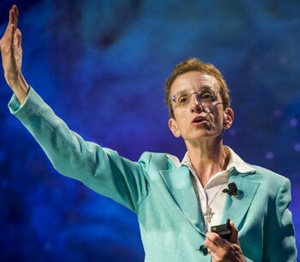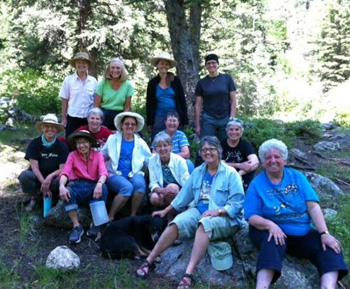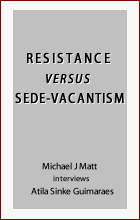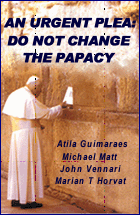Talks with Jan
 |
 |
 |
 |
 |
 |
 |
Progressivist Sisters Rejoice over Laudato Si’
My friend Jan asked me what I thought about the latest papal Encyclical “Laudato Si’,” Francis’ 184-page on the environment. Right now we are seeing a barrage of interpretations coming from conservative and traditional commentators. In its essence, it followed the lines predicted by our web editor Atila Guimarães in his column last month, which I suggested that she read here.
I thought it would be interesting to take Jan behind the enemy lines – that is, into the progressivist Catholic camp, to see the reactions there. What better camp to observe than that of the progressivist sisters? Overwhelmingly, the sisters I found talked about feeling excited, optimistic and grateful to their beloved Francis, who, they declare, is putting the Church back on track in following the guidelines of Vatican II and entering the modern world.
With this tactic, I am aiming at two birds with one stone: First, Jan will have a good idea of the evolutionary and communist tone of the Pope’s lamentable encyclical; second, it makes evident the complete apostasy within the mainstream female Orders, a fruit of Vatican II. Catholic sisters, once the shining light of Catholic institutions admired everywhere for their fidelity to the Faith and personal self-sacrifice, have become a new breed of religious women. These sisters are committed to “social justice,” green ecology, evolution and their academic careers.
A theology of evolution
Like most modern sisters, Franciscan Sr. Ilia Delio has many academic titles. Among them, she is Haub Director of Catholic Studies, visiting Professor at Georgetown University and general editor of the book series Catholicity in an Evolving Universe. She praised the encyclical, calling it “remarkable.”
 “It’s not just a statement, it’s a teaching document, it’s an action document. It’s about the survival of the planet – what we’re doing to it is a sin.”
“It’s not just a statement, it’s a teaching document, it’s an action document. It’s about the survival of the planet – what we’re doing to it is a sin.”
Clearly Sr. Delio has a new notion of sin, which would no longer be a violation of the Ten Commandments. No, sin lies in the “structures ... inequalities of gender and the rich and the poor countries.” This is what she affirms that Francis is teaching in the new encyclical.
She also shares with Francis what she calls “a theology of evolution,” which is developed in the encyclical in “a bold engagement with science.”
Affirming an ‘integral ecology’
 Sr. Margaret Galiardi designed and co-taught a class at Molloy College in Rockville Centre, Long Island, titled “The Rights of Nature.” It was all about relationships with humans and the earth, showing how humans have transgressed the rights of “Mother Earth.”
Sr. Margaret Galiardi designed and co-taught a class at Molloy College in Rockville Centre, Long Island, titled “The Rights of Nature.” It was all about relationships with humans and the earth, showing how humans have transgressed the rights of “Mother Earth.”
She sees Francis’ encyclical as continuity with Paul VI’s phrase “integral development” that appeared in the 1967 Encyclical On the Progress of Peoples, a work Francis references in his document. Francis dedicates the fourth chapter in its entirety to “integral ecology,” which Galiardi re-terms as “whole-making,” that is, “making wholes where artificial and fallacious divisions have grown up over centuries.”
She also exults that, with Francis' words, “the biblically inspired dominion model of relating to creation has been permanently retired,” She asserts, “We must forcefully reject the notion that our being made in the image of God justifies absolute domination over other creatures.” In effect, she affirms, now we must recognize the rights of the earth and every micro-organism, etc., which are all equal to man. This is how the eco-feminist sisters are interpreting Laudato si.
Global warming ‘reality’
Susan Rose Francois is a member of the Sisters of St. Joseph of Peace but, like so many modern religious, she does not bother to put the title Sr. in front of her name. She was eagerly awaiting the document and was not disappointed with its contents: “It is certainly significant and meaningful to have a religious and world leader with the credibility of Pope Francis, who unequivocally states that we are presently witnessing a disturbing warming of the climatic system … mainly as a result of human activity.”
So, we see that Francis has officially adopted the myth of global warming or climate change as the root of his position, despite the lack of scientific evidence that it exists and the many renowned scientists who challenge that bogus position.
An ecumenical vision
 Sr. Joan Brown was leading a women’s wilderness camping retreat in New Mexico, at right, when Laudato Si was released. The participants are “Mennonites, Catholics, former Catholics, Buddhists, agnostics – religion isn’t important.” What matters, she notes, is that “they are all very concerned about climate change, devastation to the planet, an economic system that creates more poverty and disparity, and a human path leading to the brink of destruction and soulless lives of consumerism.”
Sr. Joan Brown was leading a women’s wilderness camping retreat in New Mexico, at right, when Laudato Si was released. The participants are “Mennonites, Catholics, former Catholics, Buddhists, agnostics – religion isn’t important.” What matters, she notes, is that “they are all very concerned about climate change, devastation to the planet, an economic system that creates more poverty and disparity, and a human path leading to the brink of destruction and soulless lives of consumerism.”
She is a Franciscan sister who promotes the “new Cosmic Story” and multicultural experiences. The encyclical ‘sings’ through her “like the ancient Canticle of Creation by St. Francis.” Her "organizer’s mind" is already at work planning how the Pope's encyclical can be of service to issues like the Clean Power Plan, the Green Climate Fund and a binding global treaty on climate change in Paris at the end of the year.
How different are the missions and vocation of these post-Vatican II sisters, not concerned about spreading the one true Faith but rather completely immersed in ecology, “social justice” and establishing a one world government.
An empowering tool
After discerning her vocation to “environmental ministry,” Philippine Sister ‘Marvie’ (Marvelous) Misolas interned at the Maryknoll Ecological Sanctuary in her country and is now running environmental seminars and retreats there. She embraces the new social mission of Vatican II sisters and believes the encyclical will help to “empower and guide activists” like herself to change the environmental laws of countries.
A green new world
“It is a time for all of us to wake up,” said Sr. Teresita Abraham, a Presentation sister originally from India who lives in Zambia and is creating the Garden of Oneness, an eco-spiritual organic garden and retreat center. The encyclical, Abraham said, is a wake-up call for Catholics and the entire world to “care for the earth” and be in communion with God, with one another and all of creation. “Pope Francis mentioned this trinity of God, humans and earth throughout the encyclical,” she notes.
So, we have a new sacred trinity, a new notion of relationship with God and a new way of being Catholic that ignores dogma and religion and focus on experiencing the peace and sacredness of the Earth. The Presentation sisters' spirituality, Abraham explains, is based on belief in the sacredness of the earth and universe, which has become the prime focus of their mission as sisters...
Fighting Capitalism’s ‘destructive system’
 Nun on the Bus sister Simone Campbell, director of NETWORK, a social justice lobby, also underscores Francis’ message of an “integral ecology, not an economy of exclusion.” She takes his environmental message into the socio-political sphere emphasizing what she considers to be Capitalism’s destructive system that has resulted in “the marginalization of our most vulnerable sisters and brothers and served as a principal cause of the current ecological crisis.”
Nun on the Bus sister Simone Campbell, director of NETWORK, a social justice lobby, also underscores Francis’ message of an “integral ecology, not an economy of exclusion.” She takes his environmental message into the socio-political sphere emphasizing what she considers to be Capitalism’s destructive system that has resulted in “the marginalization of our most vulnerable sisters and brothers and served as a principal cause of the current ecological crisis.”
In Francis’ name, she calls on the world to challenge those who pollute and dominate the Earth, to give greater voice to victims of learning and domination, to indigenous communities, and to the marginalized in society. “The income and wealth gap in our world is part of the problem,” Campbell explains, and praises Francis for seeing “the inter-connectedness” of climate, economic disparity, migration, hunger and poverty. In her view Francis is promoting a one world order based on the communist principles she shares.
A change in lifestyle
What all sisters note is that Francis is calling everyone to a change of lifestyle. Is this meant to be a call to deeper spirituality, a return to the practice of Faith and the Commandments, a moral renewal?
Absolutely not! It is a call to cut energy use, recycle, eat less meat and buy locally produced food. It is a call to phase out use of fossil fuels, improve public transportation and curb consumption. What Francis and the Sisters are promoting is not only a miserablist Church, but a communist society where no one is more than another and in which everyone has the same rights as animals, trees, micro-organisms – every living thing.

I thought it would be interesting to take Jan behind the enemy lines – that is, into the progressivist Catholic camp, to see the reactions there. What better camp to observe than that of the progressivist sisters? Overwhelmingly, the sisters I found talked about feeling excited, optimistic and grateful to their beloved Francis, who, they declare, is putting the Church back on track in following the guidelines of Vatican II and entering the modern world.
With this tactic, I am aiming at two birds with one stone: First, Jan will have a good idea of the evolutionary and communist tone of the Pope’s lamentable encyclical; second, it makes evident the complete apostasy within the mainstream female Orders, a fruit of Vatican II. Catholic sisters, once the shining light of Catholic institutions admired everywhere for their fidelity to the Faith and personal self-sacrifice, have become a new breed of religious women. These sisters are committed to “social justice,” green ecology, evolution and their academic careers.
A theology of evolution
Like most modern sisters, Franciscan Sr. Ilia Delio has many academic titles. Among them, she is Haub Director of Catholic Studies, visiting Professor at Georgetown University and general editor of the book series Catholicity in an Evolving Universe. She praised the encyclical, calling it “remarkable.”

Sr. Ilia Delio
Clearly Sr. Delio has a new notion of sin, which would no longer be a violation of the Ten Commandments. No, sin lies in the “structures ... inequalities of gender and the rich and the poor countries.” This is what she affirms that Francis is teaching in the new encyclical.
She also shares with Francis what she calls “a theology of evolution,” which is developed in the encyclical in “a bold engagement with science.”
Affirming an ‘integral ecology’

Sr. Margaret Galiardi
She sees Francis’ encyclical as continuity with Paul VI’s phrase “integral development” that appeared in the 1967 Encyclical On the Progress of Peoples, a work Francis references in his document. Francis dedicates the fourth chapter in its entirety to “integral ecology,” which Galiardi re-terms as “whole-making,” that is, “making wholes where artificial and fallacious divisions have grown up over centuries.”
She also exults that, with Francis' words, “the biblically inspired dominion model of relating to creation has been permanently retired,” She asserts, “We must forcefully reject the notion that our being made in the image of God justifies absolute domination over other creatures.” In effect, she affirms, now we must recognize the rights of the earth and every micro-organism, etc., which are all equal to man. This is how the eco-feminist sisters are interpreting Laudato si.
Global warming ‘reality’
Susan Rose Francois is a member of the Sisters of St. Joseph of Peace but, like so many modern religious, she does not bother to put the title Sr. in front of her name. She was eagerly awaiting the document and was not disappointed with its contents: “It is certainly significant and meaningful to have a religious and world leader with the credibility of Pope Francis, who unequivocally states that we are presently witnessing a disturbing warming of the climatic system … mainly as a result of human activity.”
So, we see that Francis has officially adopted the myth of global warming or climate change as the root of his position, despite the lack of scientific evidence that it exists and the many renowned scientists who challenge that bogus position.
An ecumenical vision

A nuns' retreat in New Mexico led by Sr. Joan Brown, second from the right in the first row
She is a Franciscan sister who promotes the “new Cosmic Story” and multicultural experiences. The encyclical ‘sings’ through her “like the ancient Canticle of Creation by St. Francis.” Her "organizer’s mind" is already at work planning how the Pope's encyclical can be of service to issues like the Clean Power Plan, the Green Climate Fund and a binding global treaty on climate change in Paris at the end of the year.
How different are the missions and vocation of these post-Vatican II sisters, not concerned about spreading the one true Faith but rather completely immersed in ecology, “social justice” and establishing a one world government.
An empowering tool
After discerning her vocation to “environmental ministry,” Philippine Sister ‘Marvie’ (Marvelous) Misolas interned at the Maryknoll Ecological Sanctuary in her country and is now running environmental seminars and retreats there. She embraces the new social mission of Vatican II sisters and believes the encyclical will help to “empower and guide activists” like herself to change the environmental laws of countries.
A green new world
“It is a time for all of us to wake up,” said Sr. Teresita Abraham, a Presentation sister originally from India who lives in Zambia and is creating the Garden of Oneness, an eco-spiritual organic garden and retreat center. The encyclical, Abraham said, is a wake-up call for Catholics and the entire world to “care for the earth” and be in communion with God, with one another and all of creation. “Pope Francis mentioned this trinity of God, humans and earth throughout the encyclical,” she notes.
So, we have a new sacred trinity, a new notion of relationship with God and a new way of being Catholic that ignores dogma and religion and focus on experiencing the peace and sacredness of the Earth. The Presentation sisters' spirituality, Abraham explains, is based on belief in the sacredness of the earth and universe, which has become the prime focus of their mission as sisters...
Fighting Capitalism’s ‘destructive system’

Sr. Simone Campbell
In Francis’ name, she calls on the world to challenge those who pollute and dominate the Earth, to give greater voice to victims of learning and domination, to indigenous communities, and to the marginalized in society. “The income and wealth gap in our world is part of the problem,” Campbell explains, and praises Francis for seeing “the inter-connectedness” of climate, economic disparity, migration, hunger and poverty. In her view Francis is promoting a one world order based on the communist principles she shares.
A change in lifestyle
What all sisters note is that Francis is calling everyone to a change of lifestyle. Is this meant to be a call to deeper spirituality, a return to the practice of Faith and the Commandments, a moral renewal?
Absolutely not! It is a call to cut energy use, recycle, eat less meat and buy locally produced food. It is a call to phase out use of fossil fuels, improve public transportation and curb consumption. What Francis and the Sisters are promoting is not only a miserablist Church, but a communist society where no one is more than another and in which everyone has the same rights as animals, trees, micro-organisms – every living thing.

Posted July 1, 2015
______________________
______________________








